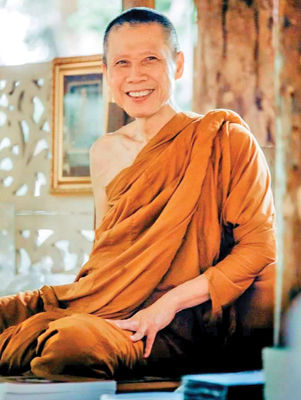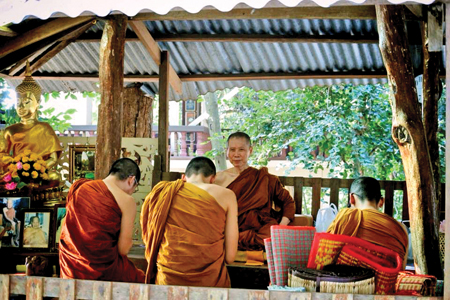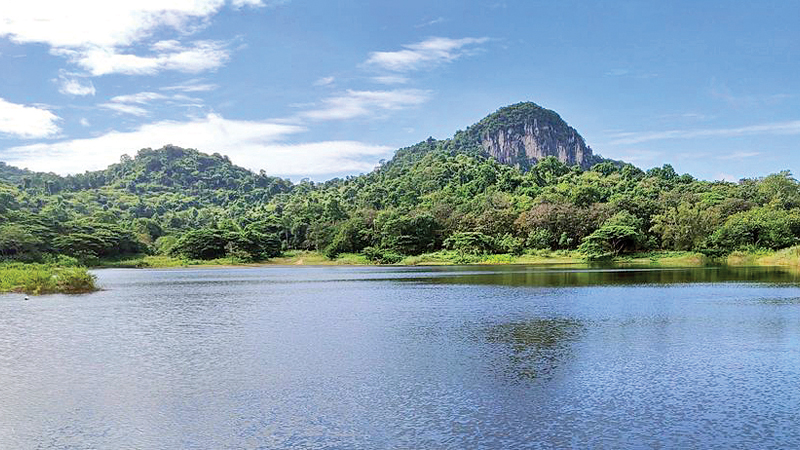The following are excerpts from an interview with Theravada Bhikkhu Ven. Ajahn Suchart Abhijato Maha Thera of Thailand. The Maha Thera is well-known across the globe for his effective Dhamma teaching methods and meditation practice.
Q: You recently said that the mind is like a fiction writer.
A: Yeah. We can write anything if we are fiction writers. The mind is like a fiction writer because it can create any character it wants to create. It creates ‘a self’ and uses it as the main character of the story.
Q: Is it correct to say that true happiness comes from within rather than from external sources?

Ven. Ajahn Suchart Abhijato Maha Thera
A: That’s right. You have to go inside the mind. You have to still the mind in order to go within. To still your mind, you have to stop your cravings.
Q: Ironically, many people believe that happiness is something found in the outside world.
A: Yeah. All they consider as happiness turns out to be suffering sooner or later.
Q: Does true happiness mean “living in the present moment”?
A: True happiness is “whenever there is no craving.” Whenever you have cravings, there is Dukkha. So, when you stop your cravings, happiness naturally arises.
Q: Is following the Five Precepts alone sufficient to achieve a better rebirth
A: Yes, if you follow the Five Precepts you will not be born as an animal, hungry ghost, or in hell. Following the Precepts prevents you from going to these lower realms
Q: Many people suffer from depression more than ever before. How can Buddhist meditation and the Buddhist way of life help people overcome depression?
A: Depression is caused by cravings. When you crave for something and you can’t get it, you become sad and become depressed. So when you understand that you can stop your cravings, you will find out that you don’t have to have anything to be happy. Then you will stop craving for other things. When you stop craving for things you will neither feel sad nor disappointed when you do not get them. Then you will not get depressed.
Q: When a person is deeply depressed and unable to think clearly he/she may need counselling. How can we help such a person?
A: They can stay at a monastery or join a meditation retreat – perhaps a ten-day retreat or so. This can help them find peace and clarity.
Q: Can a person who reads Dhamma books and listens to Dhamma discussions, but does not practise meditation, enter the Path or attain Sotapanna?
A: If you can suppress or eliminate your defilements, you can attain Sotapanna. But the problem is, without meditation, it is difficult to develop the strength to suppress or eliminate your defilement unless you have established meditation in a past life. If you have equanimity, you can stop your defilements when you are asked to do so. If you can stop your defilements then you can become enlightened – you can enter into the Path right away.
 When the Buddha gave his first discourse to the Five Ascetics he did not teach them meditation because he knew that they already had equanimity. So the Buddha just had to tell them to stop defilements. When they stopped their cravings they became enlightened. Likewise, if you can stop your defilements, you can become enlightened.
When the Buddha gave his first discourse to the Five Ascetics he did not teach them meditation because he knew that they already had equanimity. So the Buddha just had to tell them to stop defilements. When they stopped their cravings they became enlightened. Likewise, if you can stop your defilements, you can become enlightened.
Q: How can Buddhist mindfulness practices influence leadership and decision-making in the context of sustainable development?
A: When you meditate, your mind becomes calm and more rational rather than emotional. Therefore, decisions made with a calm and rational mind are likely to be more correct compared to those based on emotions.
Q: Should we always contribute to monks who request money for building or renovating temples?
A: First of all, monks are not supposed to ask for money for support unless it has been offered beforehand. If it has been offered in advance, they may inquire about the offering. For instance, if you have already told me that you would offer me some robes, then I can ask you about them. But if nothing was said beforehand, I cannot approach you now and ask you to buy me robes.
Q: Sometimes it’s difficult to control cravings, especially for sweets. What is the Buddhist approach to controlling such cravings by training the mind?
A: You can do it step by step, gradually. You do not have to eliminate them all at once. Start by reducing the intake of what you like to have. Then slowly try to adjust your mind or body to this reduction.
Q: Do we have to convince the mind that eating sweets is not good for us?
A: Well, medical information says that it is not good for you.
Q: So should we focus on the medical aspect when trying to control our craving for a particular food?
A: That can help. But the main goal is to see the harm in your cravings, not in the food that you take. What you eat can be harmful to your body, but it is not harmful to your mind. What is harmful to your mind is your craving.
Q: Is the number of years we live predetermined? Some live short lives, while others enjoy long lives.
 A: No, the number of years depends on different factors such as heredity – whether you inherit any diseases from your parents –and your lifestyle, as well as the way you live. For instance, what kind of substances you consume—whether you drink alcohol, smoke, or take drugs—can affect your lifespan. These are conditions that can shorten or extend your life besides Kamma. While Kamma contributes to the length of your life, it is not the only factor.
A: No, the number of years depends on different factors such as heredity – whether you inherit any diseases from your parents –and your lifestyle, as well as the way you live. For instance, what kind of substances you consume—whether you drink alcohol, smoke, or take drugs—can affect your lifespan. These are conditions that can shorten or extend your life besides Kamma. While Kamma contributes to the length of your life, it is not the only factor.
Q: Many are of the view that t people live longer due to medical advancements. Does this mean that modern medicine and scientific progress can influence our karmic cycle
A: It can be a factor. But it can also have the opposite effect. Many people die from road accidents, firearms, and bombs. These external factors contribute to the number of years a person may live.
The Buddha said that it is best to look at these things as anatta – they are not within our control. Try to do your best and try to control whatever factor you can control – like your consumption patterns. Don’t take alcohol, do not take drugs, don’t smoke, do a lot of exercise and eat moderately. These habits contribute to your longevity. But some conditions are beyond your control like other people. Other people’s actions are not something that you can control, or even the climate or weather. These are things that can affect your life. So you just have to make the best of it. The best thing is to accept that life, whether long or short, will eventually end. Then you won’t feel too bad about it. The real purpose of life is to become Enlightened. So concentrate on practising to become enlightened. Everything else does not matter once you become enlightened, because you know that this will be your last birth and you will not be reborn again.
Q: For those who find it difficult to use the ‘Buddho Buddho’ Mantra to maintain mindfulness, could you recommend an alternative
A: Watch what your body is doing – walking, standing, sitting, eating,taking a shower or dressing. Whatever you do with your body, keep watching the activity.
Q: Even when we get a negative thought, do we have to analyse that thought?
A:: No. Just ignore the thought. Just keep focusing. It is not yet the time to analyse the thought because you do not have the ‘tool’- you do not have enough mindfulness to stop them. So first you have to have the ‘tool’ before you can deal with your thoughts. First, focus on your mind, so that bad thoughts will not be able to surface.
Q: When we meditate do we need to sit or follow a specific posture?
A:: You can meditate in any posture you like. But ultimately you may want to sit on the floor if you want to meditate for a longer time.
Q: Is it appropriate for Bhikkhus to engage in politics or lead political parties?
A: No. This is not a monk’s ‘business’ at all. A monk’s responsibility is spiritual, focused on practicing Seela, Samadhi, and Panna. This is the work monks are meant to do.
In Thailand, monks are not allowed to vote. We don’t have the right to vote and we give up the right to vote when we take the vow as a monk. It is a separate world. Monks’ world is a spiritual one, not material. So we renounce all material things and have nothing to do with them.
– Ven. Ajahn Suchart Abhijato Maha Thera was born on November 2, 1947. Having completed his degree in Civil Engineering at California State University, Fresno, USA, he returned to his motherland where he designed an ice cream parlour for a brief stint.
Quite soon, inspired by a Dhamma book, he decided to go in search of “true happiness,” to find inner peace through the practice of Buddhist meditation. He became a bhikkhu at the age of 27 and received ordination at Wat Bovornives in Bangkok on February 19, 1975, with Somdet Phra Ñanasarivara, the late Supreme Patriarch (Somdet Phra Sangharaja), as his Preceptor.
Ven. Ajahn Suchart Abhijato Maha Thera resides in Wat Yansangwararam, Thailand.









